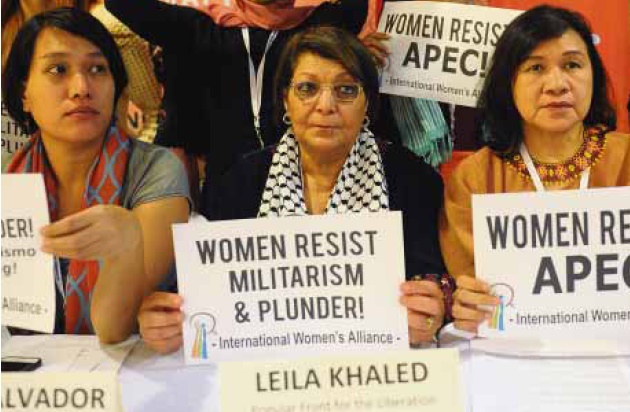
FREEDOM FIGHTER IN TOWN Palestinian freedom fighter and two-time plane hijacker Leila Khaled (center) joins Gabriela party-list Rep. Liza Maza (right) and other women activists during the International Women’s Alliance General Assembly forum in Manila on Wednesday. The forum was protesting the Philippines’ hosting of the Apec Leaders’ meeting next week. AFP
The maritime disputes in the South China Sea and the stalled Enhanced Defense Cooperation Agreement (Edca) are high on the agenda of the bilateral meeting between President Aquino and US President Barack Obama during the Asia-Pacific Economic Cooperation (Apec) Summit in Manila next week.
Mr. Aquino and Obama will meet on the sidelines of the summit on Nov. 18 and 19 for discussions on bilateral relations, US Ambassador to the Philippines Philip Goldberg told reporters Wednesday after a ceremony honoring Filipino and American veterans who fought in World War I at the Manila American Cemetery and Memorial in Taguig City.
“His (Obama’s) primary reason for being here is the leaders’ summit. During that time, there will be meetings with President Aquino and other events to [discuss] our bilateral relationship,” Goldberg said.
While the Philippines has committed not to raise the territorial dispute with China in the South China Sea during the summit, it has enough leeway to do so at bilateral meetings between its officials and officials of other Apec economies.
“Apec itself is concentrated on its economic agenda, and not on political, military and security issues. But bilateral meetings are something else, obviously they will encompass the full array of the US and Philippine ties,” Goldberg said.
Key points of discussion
He said the Philippines’ territorial dispute with China and the Edca would be among the key points to be discussed in the bilateral meeting between Obama and President Aquino.
“I would imagine they will. When the two presidents meet, those issues are of mutual concerns,” Goldberg said.
The signing of Edca was timed for the overnight visit of Obama to Manila last year.
The 10-year accord would allow the US military greater access to Philippine military camps and enable it to bring in more troops and preposition weapons and supplies on Philippine territory.
The agreement is clearly intended to strengthen the Philippines’ defense against China’s incursions into the West Philippine Sea, part of the South China Sea within the Philippines’ 360-kilometer exclusive economic zone recognized under the United Nations Convention on the Law of the Sea.
Question of legality
The constitutionality of the agreement, however, has been challenged in the Supreme Court, while the Senate has adopted a resolution declaring the deal invalid without its concurrence.
The Department of Foreign Affairs (DFA) Wednesday brushed aside the Senate resolution, saying only the Supreme Court could “rule on the constitutionality of Edca.”
“We ourselves are waiting for the Supreme Court’s decision. Should it find [Edca] constitutional then that will be a welcome development because the executive department is the one who worked out that agreement,” said Assistant Foreign Secretary Charles Jose, spokesperson for the DFA.
The Supreme Court opened deliberations on Edca on Tuesday and set the next discussions for Nov. 16.
“We, of course, are waiting for a very important Supreme Court decision. We have a very good Edca and we are looking forward to implementing it when the time is right, when all of the decisions have been made,” Goldberg said.
He refused to disclose the details of Obama’s visit, saying the White House would make an announcement soon.
Asked if Obama would have a bilateral meeting with Chinese President Xi Jinping, Goldberg refused to answer.
PH arbitration case
The Philippines has challenged China’s claims to almost the entire South China Sea in the United Nations Permanent Court of Arbitration in The Hague, and won the first round with a decision by the tribunal to accept the case for hearing later this month.
The ruling angered China, which has boycotted the arbitration and said it will not recognize any decision by the court.
In spite of the setback for China, Xi is coming to Manila for the Apec summit, and the Philippine government has agreed not to raise the dispute to keep the meeting a forum for economic discussions.
But after the Apec summit, the Philippines plans to return to The Hague for oral arguments on the merits of the case it has brought against China.
The arbitral court will hear oral arguments on the case from Nov. 24 to 30.
“Headed by our lead agent, Solicitor General Florin Hilbay and in consultation with our legal counsels, we are strengthening our legal arguments in preparation for the next round of oral hearings,” Jose said in a text message.